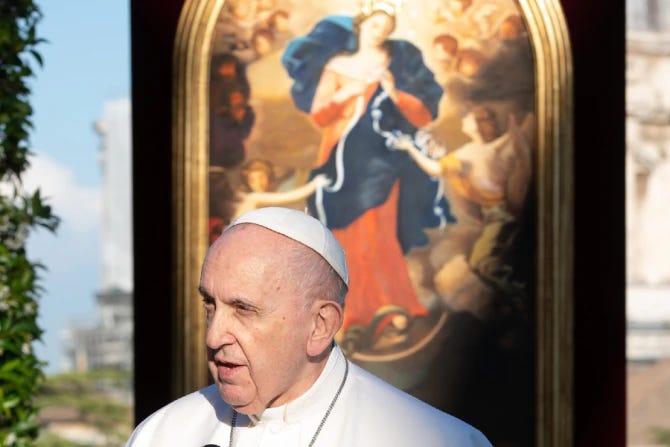On Francis
“God is the God of Law, but he is also the God of surprises."
“God is the God of Law, but he is also the God of surprises,” Pope Francis preached in 2014. “God is always new."
Francis himself was one of God’s great surprises.
He was the public figure who has, more than any other, shaped my sense of the world and of the work that needs to be done.
Twelve years ago, I was 23 and civically disappointed, bitterly coming to terms with the false promises of modern American politics and technology. None of the shiny paths forward that had been sold to our generation felt like they were heading anywhere good.
Then, out of nowhere, a surprise!
A world leader emerged who would illuminate a new path — one that led past our day’s deadened binaries toward a credible, living counterculture.
Nothing about Francis was as you would have expected. The young firebrand was 76 years old. The Bishop of Rome was a Jesuit from Latin America. He took as his name the patron saint of the poor and of ecology — and he worked to live up to his namesake from the get-go.
His vision for the church was neither progressive nor traditional — it was not primarily about ideology or even theology at all. (“We do not serve ideas, we serve people,” he would admonish ideologues.) Rather, his vision was about the structure of the church: Closeness, proximity was the goal. The work was to remove anything that stood in the way of the church being close to the people.
His messages were full of concrete images making his point: He wanted “four-wheel drive bishops” who would go out to all terrains in all weather. He wanted the church to be a “field hospital after battle” — a place where wounds are healed and hearts are warmed (rather than a place where the wounded were interrogated over “if they have high cholesterol”). Faith was not to be explained as “a light which scatters all our darkness” but as “a lamp which guides our steps in the night and suffices for the journey” — for God is not primarily a provider of arguments, but an “accompanying presence, a history of goodness which touches every story of suffering and opens up a ray of light.”
Francis’ papacy would rejuvenate that great Catholic word: Mercy. It was at the center of Francis’ vision for the church. What did it mean? Francis’ fellow Jesuit James F. Keenan has a lovely definition: Mercy is “a willingness to enter into the chaos of another.” It’s what God does for us (by accompanying us in our messy lives) and it’s what the church needs to do to fulfill its mission—by going out to the peripheries; by working in the streets; by being among, not above, the people.
And it’s what we are each called to do, as well. We were reminded by Francis in countless ways that callousness — a lack of mercy — is the great sin of modern life.
I have learned from Francis that when we become callous to others, we become callous to the God of surprises. The world slowly deadens as we become more insular, distant, and abstract. When we open the doors, when we go out to the edges, when we get up close to the concrete, particulars of world — that’s when it all comes alive again! That’s where the God of surprises is waiting for us — not in perfect plans and predictions, but in the strange and wonderful adventure that is relationship with any given person.
I used to believe that prophecy was about seeing some divine blueprint — some obscured, but static thing out there. But the more you study the prophets, the more you see that they were simply people who had chipped away at their callousness so as to deepen their relationship — a particular, embodied, dynamic relationship — with the divine. Francis understood this so well. The absolute is not “something detached, something lacking any relationship,” he wrote to an inquiring non-believer in 2013. “The truth is a relationship!”
And the foundation of any living relationship is a willingness to be surprised. If you already think you know the score about someone, you can’t have a living relationship with them. You see them as an algorithm — you leave no space for a connection to grow. The same goes for our relationship with history, or even existence: If we already think we know the score about how the world works, or how the future will unfold, we can’t have a relationship with life itself.
But Francis relentlessly preached, in words and deeds and reforms, that we can’t know the score in this way, for the God of surprises is always waiting there for us, here to help untie the tangled knots of our histories, both personal and collective. What a joy — what have we done to deserve this? O Mercy!



"The foundation of any living relationship is a willingness to be surprised." Beautifully and truthfully said, Pete. This is a great tribute to a great man; many thanks!
So much here is both balm and challenge - I especially like Kennan’s and your thoughts on mercy. Thank you Pete for guiding me to deeply think on a micro and macro level about our possibilities.